Related Research Articles
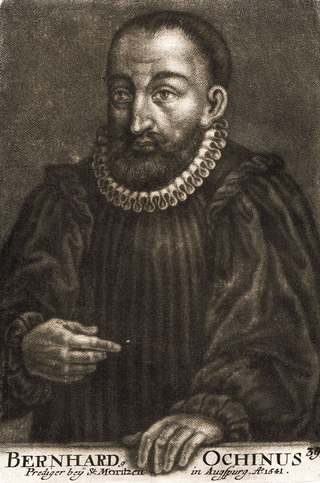
Bernardino Ochino (1487–1564) was an Italian, who was raised a Roman Catholic and later turned to Protestantism and became a Protestant reformer.

Desiderius Erasmus Roterodamus was a Dutch Christian humanist, Catholic theologian, educationalist, satirist and philosopher. Through his vast number of translations, books, essays, prayers and letters, he is considered one of the most influential thinkers of the Northern Renaissance and one of the major figures of Dutch and Western culture.

Sir Thomas More, venerated in the Catholic Church as Saint Thomas More, was an English lawyer, judge, social philosopher, author, statesman, amateur theologian, and noted Renaissance humanist. He also served Henry VIII as Lord High Chancellor of England from October 1529 to May 1532. He wrote Utopia, published in 1516, which describes the political system of an imaginary island state.

A straw man fallacy is the informal fallacy of refuting an argument different from the one actually under discussion, while not recognizing or acknowledging the distinction. One who engages in this fallacy is said to be "attacking a straw man".
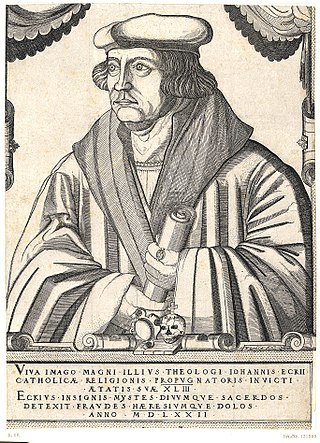
Johann Maier von Eck, often anglicized as John Eck, was a German Catholic theologian, scholastic, prelate, and a pioneer of the counter-reformation who was among Martin Luther's most important interlocutors and theological opponents.

John Fisher was an English Catholic bishop, cardinal, and theologian. Fisher was also an academic and Chancellor of the University of Cambridge. He is honoured as a martyr and saint by the Catholic Church.
Ad fontes is a Latin expression which means "[back] to the sources". The phrase epitomizes the renewed study of Greek and Latin classics in Renaissance humanism, subsequently extended to Biblical texts. The idea in both cases was that sound knowledge depends on the earliest and most fundamental sources.

The Defence of the Seven Sacraments is a theological treatise published in 1521, written by King Henry VIII of England, allegedly with the assistance of Sir Thomas More. The extent of More's involvement with this project has been a point of contention since its publication.

Justus Menius was a German Lutheran pastor and Protestant reformer whose name is Latinized from Jost or JustMenig.

JeromeEmser, German theologian and antagonist of Luther, was born of a good family at Ulm.
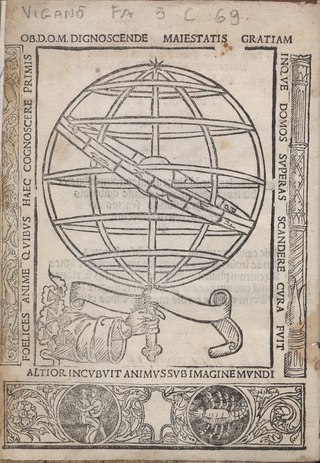
Sylvester Mazzolini, in Italian Silvestro Mazzolini da Prierio, in Latin Sylvester Prierias (1456/1457–1527), was a theologian born at Priero, Piedmont; he died at Rome. Prierias perished when the imperial troops forced their way into the city, leading to the Sack of Rome.
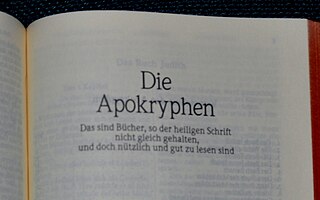
The biblical apocrypha denotes the collection of apocryphal ancient books thought to have been written some time between 200 BC and AD 100. The Catholic, Eastern Orthodox and Oriental Orthodox churches include some or all of the same texts within the body of their version of the Old Testament, with Catholics terming them deuterocanonical books. Traditional 80-book Protestant Bibles include fourteen books in an intertestamental section between the Old Testament and New Testament called the Apocrypha, deeming these useful for instruction, but non-canonical. To this date, the Apocrypha are "included in the lectionaries of Anglican and Lutheran Churches". Anabaptists use the Luther Bible, which contains the Apocrypha as intertestamental books; Amish wedding ceremonies include "the retelling of the marriage of Tobias and Sarah in the Apocrypha". Moreover, the Revised Common Lectionary, in use by most mainline Protestants including Methodists and Moravians, lists readings from the Apocrypha in the liturgical calendar, although alternate Old Testament scripture lessons are provided.

The Corpus Catholicorum is a collection of sixteenth-century writings by the leading proponents and defenders of the Roman Catholic Church against the teachings of the Protestant reformers.
Joseph Creswell was an English Jesuit controversialist.
Edward Powell was a Welsh Roman Catholic priest and theologian, in opposition to Henry VIII of England. He is a Catholic martyr, beatified in 1886.
The Yale Edition of the Complete Works of St. Thomas More is the standard scholarly edition of the works of Thomas More, published by Yale University Press. The first of the fifteen volumes to be published appeared in 1963, and the last in 1997. The English works are provided with glossaries, and the Latin works with facing English translations.
Andreas Eudaemon-Joannis (1566–1625) was a Greek Jesuit, natural philosopher and controversialist. He was sometimes known as Cydonius.
Benedict Chelidonius or Schwalbe was an abbot of the Scottish monastery at Vienna. A scholar of Greek and a Neo-Latin poet, he worked with the artist Albrecht Dürer. In some of his publications he took the name Musophilus.
Against Henry, King of the English, originally in Latin as Contra Henricum Regem Anglie, was a book written in 1522 by Martin Luther against Henry VIII of England. It was a response to Henry's book, Assertio septem sacramentorum. Thomas More then wrote Responsio ad Lutherum as a reply.
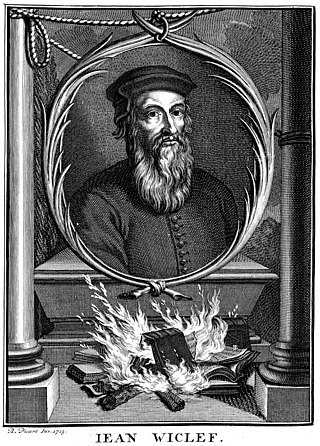
Proto-Protestantism, also called pre-Protestantism, refers to individuals and movements that propagated various ideas later associated with Protestantism before 1517, which historians usually regard as the starting year for the Reformation era. The relationship between medieval sects and Protestantism is an issue that has been debated by historians.
References
- ↑ p.280, Thomas More, Richard Marius, 1984, J.M. Dent and Son
- ↑ Brian Gogan (1982). The Common Corps of Christendom: Ecclesiological Themes in the Writings of Sir Thomas More. BRILL. p. 2. ISBN 90-04-06508-3.